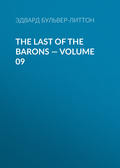
Эдвард Бульвер-Литтон
"My Novel" — Volume 12
CHAPTER IV
Helen and Violante had been conversing together, and Helen had obeyed her guardian's injunction, and spoken, though briefly, of her positive engagement to Harley. However much Violante had been prepared for the confidence, however clearly she had divined that engagement, however before persuaded that the dream of her childhood was fled forever, still the positive truth, coming from Helen's own lips, was attended with that anguish which proves how impossible it is to prepare the human heart for the final verdict which slays its future. She did not, however, betray her emotion to Helen's artless eyes; sorrow, deep-seated, is seldom self- betrayed. But, after a little while, she crept away; and, forgetful of Peschiera, of all things that could threaten danger (what danger could harm her more!) she glided from the house, and went her desolate way under the leafless wintry trees. Ever and anon she paused, ever and anon she murmured the same words: "If she loved him, I could be consoled; but she does not! or how could she have spoken to me so calmly! how could her very looks have been so sad! Heartless! heartless!"
Then there came on her a vehement resentment against poor Helen, that almost took the character of scorn or hate,—its excess startled herself. "Am I grown so mean?" she said; and tears that humbled her rushed to her eyes. "Can so short a time alter one thus? Impossible!"
Randal Leslie rang at the front gate, inquired for Violante, and, catching sight of her form as he walked towards the house, advanced boldly and openly. His voice startled her as she leaned against one of the dreary trees, still muttering to herself,—forlorn. "I have a letter to you from your father, Signorina," said Randal; "but before I give it to your hands, some explanation is necessary. Condescend, then, to hear me." Violante shook her head impatiently, and stretched forth her hand for the letter. Randal observed her countenance with his keen, cold, searching eye; but he still withheld the letter, and continued, after a pause,
"I know that you were born to princely fortunes; and the excuse for my addressing you now is, that your birthright is lost to you, at least unless you can consent to a union with the man who has despoiled you of your heritage,—a union which your father would deem dishonour to yourself and him. Signorina, I might have presumed to love you, but I should not have named that love, had your father not encouraged me by his assent to my suit."
Violante turned to the speaker, her face eloquent with haughty surprise. Randal met the gaze unmoved. He continued, without warmth, and in the tone of one who reasons calmly, rather than of one who feels acutely,
"The man of whom I spoke is in pursuit of you. I have cause to believe that this person has already intruded himself upon you. Ah, your countenance owns it; you have seen Peschiera? This house is, then, less safe than your father deemed it. No house is safe for you but a husband's. I offer to you my name,—it is a gentleman's; my fortune, which is small; the participation in my hopes of the future, which are large. I place now your father's letter in your hand, and await your answer." Randal bowed slightly, gave the letter to Violante, and retired a few paces.
It was not his object to conciliate Violante's affection, but rather to excite her repugnance, or at least her terror,—we must wait to discover why; so he stood apart, seemingly in a kind of self-confident indifference, while the girl read the following letter:
"My child, receive with favour Mr. Leslie. He has my consent to address you as a suitor. Circumstances of which it is needless now to inform you render it essential to my very peace and happiness that your marriage should he immediate. In a word, I have given my promise to Mr. Leslie, and I confidently leave it to the daughter of my House to redeem the pledge of her anxious and tender father."
The letter dropped from Violante's hand. Randal approached, and restored it to her. Their eyes met. Violante recoiled.
"I cannot marry you," said she, passionately.
"Indeed?" answered Randal, dryly. "Is it because you cannot love me?"
"Yes."
"I did not expect that you would as yet, and I still persist in my suit. I have promised to your father that I would not recede before your first unconsidered refusal."
"I will go to my father at once."
"Does he request you to do so in his letter? Look again. Pardon me, but he foresaw your impetuosity; and I have another note for Lady Lansmere, in which he begs her ladyship not to sanction your return to him (should you so wish) until he come or send for you himself. He will do so whenever your word has redeemed his own."
"And do you dare to talk to me thus, and yet pretend to love me?"
Randal smiled ironically.
"I pretend but to wed you. Love is a subject on which I might have spoken formerly, or may speak hereafter. I give you some little time to consider. When I next call, let me hope that we may fix the day for our wedding."
"Never!"
"You will be, then, the first daughter of your House who disobeyed a father; and you will have this additional crime; that you disobeyed him in his sorrow, his exile, and his fall."
Violante wrung her hands.
"Is there no choice, no escape?"
"I see none for either. Listen to me. I love you, it is true; but it is not for my happiness to marry one who dislikes me, nor for my ambition to connect myself with one whose poverty is greater than my own. I marry but to keep my plighted faith with your father, and to save you from a villain you would hate more than myself, and from whom no walls are a barrier, no laws a defence. One person, indeed, might perhaps have preserved you from the misery you seem to anticipate with me; that person might defeat the plans of your father's foe,—effect, it might be, terms which could revoke his banishment and restore his honours; that person is—"
"Lord L'Estrange?"
"Lord L'Estrange!" repeated Randal, sharply, and watching her pale parted lips and her changing colour; "Lord L'Estrange! What could he do? Why did you name him?"
Violante turned aside. "He saved my father once," said she, feelingly.
"And has interfered, and trifled, and promised, Heaven knows what, ever since: yet to what end? Pooh! The person I speak of your father would not consent to see, would not believe if he saw her; yet she is generous, noble, could sympathize with you both. She is the sister of your father's enemy, the Marchesa di Negra. I am convinced that she has great influence with her brother,—that she has known enough of his secrets to awe him into renouncing all designs on yourself; but it is idle now to speak of her."
"No, no," exclaimed Violante. "Tell me where she lives—I will see her."
"Pardon me, I cannot obey you; and, indeed, her own pride is now aroused by your father's unfortunate prejudices against her. It is too late to count upon her aid. You turn from me,—my presence is unwelcome. I rid you of it now. But welcome or unwelcome, later you must endure it—and for life."
Randal again bowed with formal ceremony, walked towards the house, and asked for Lady Lansmere. The countess was at home. Randal delivered Riccabocca's note, which was very short, implying that he feared Peschiera had discovered his retreat, and requesting Lady Lansmere to retain Violante, whatever her own desire, till her ladyship heard from him again.
The countess read, and her lip curled in disdain. "Strange!" said she, half to herself.
"Strange!" said Randal, "that a man like your correspondent should fear one like the Count di Peschiera. Is that it?"
"Sir," said the countess, a little surprised, "strange that any man should fear another in a country like ours!"
"I don't know," said Randal, with his low soft laugh; "I fear many men, and I know many who ought to fear me; yet at every turn of the street one meets a policeman!"
"Yes," said Lady Lansmere. "But to suppose that this profligate foreigner could carry away a girl like Violante against her will, —a man she has never seen, and whom she must have been taught to hate!"
"Be on your guard, nevertheless, I pray you, madam; 'Where there's a will there's a way'!"
Randal took his leave, and returned to Madame di Negra's. He stayed with her an hour, revisited the count, and then strolled to Limmer's.
"Randal," said the squire, who looked pale and worn, but who scorned to confess the weakness with which he still grieved and yearned for his rebellious son, "Randal, you have nothing now to do in London; can you come and stay with me, and take to farming? I remember that you showed a good deal of sound knowledge about thin sowing."
"My dear sir, I will come to you as soon as the general election is over."
"What the deuce have you got to do with the general election?"
"Mr. Egerton has some wish that I should enter parliament; indeed, negotiations for that purpose are now on foot."
The squire shook his head. "I don't like my half-brother's politics."
"I shall be quite independent of them," cried Randal, loftily; "that independence is the condition for which I stipulate."
"Glad to hear it; and if you do come into parliament, I hope you'll not turn your back on the land?"
"Turn my back on the land!" cried Randal, with devout horror. "Oh, sir, I am not so unnatural!"
"That's the right way to put it," quoth the credulous squire; "it is unnatural! It is turning one's back on one's own mother. The land is a mother—"
"To those who live by her, certainly,—a mother," said Randal, gravely.
"And though, indeed, my father starves by her rather than lives, and Rood Hall is not like Hazeldean, still—I—"
"Hold your tongue," interrupted the squire; "I want to talk to you. Your grandmother was a Hazeldean."
"Her picture is in the drawing-room at Rood. People think me very like her."
"Indeed!" said the squire. "The Hazeldeans are generally inclined to be stout and rosy, which you are certainly not. But no fault of yours. We are all as Heaven made us. However, to the point. I am going to alter my will,"—(said with a choking gulp). "This is the rough draft for the lawyers to work upon."
"Pray, pray, sir, do not speak to me on such a subject. I cannot bear to contemplate even the possibility of—of—"
"My death? Ha, ha! Nonsense. My own son calculated on the date of it by the insurance-tables. Ha, ha, ha! A very fashionable son, eh! Ha, ha!"
"Poor Frank! do not let him suffer for a momentary forgetfulness of right feeling. When he comes to be married to that foreign lady, and be a father himself, he—"
"Father himself!" burst forth the squire. "Father to a swarm of sallow-faced Popish tadpoles! No foreign frogs shall hop about my grave in Hazeldean churchyard. No, no. But you need not look so reproachful,— I 'm not going to disinherit Frank."
"Of course not," said Randal, with a bitter curve in the lip that rebelled against the joyous smile which he sought to impose on it.
"No; I shall leave him the life-interest in the greater part of the property; but if he marry a foreigner, her children will not succeed,— you will stand after him in that case. But—now don't interrupt me—but Frank looks as if he would live longer than you, so small thanks to me for my good intentions, you may say. I mean to do more for you than a mere barren place in the entail. What do you say to marrying?"
"Just as you please," said Randal, meekly.
"Good. There's Miss Sticktorights disengaged,—great heiress. Her lands run onto Rood. At one time I thought of her for that graceless puppy of mine. But I can manage more easily to make up the match for you. There's a mortgage on the property; old Sticktorights would be very glad to pay it off. I 'll pay it out of the Hazeldean estate, and give up the Right of Way into the bargain. You understand?
"So come down as soon as you can, and court the young lady yourself."
Randal expressed his thanks with much grateful eloquence; and he then delicately insinuated, that if the squire ever did mean to bestow upon him any pecuniary favours (always without injury to Frank), it would gratify him more to win back some portions of the old estate of Rood, than to have all the acres of the Sticktorights, however free from any other incumbrance than the amiable heiress.
The squire listened to Randal with benignant attention. This wish the country gentleman could well understand and sympathize with. He promised to inquire into the matter, and to see what could be done with old Thornhill.
Randal here let out that Mr. Thornhill was about to dispose of a large slice of the ancient Leslie estate through Levy, and that he, Randal, could thus get it at a more moderate price than would be natural, if Mr. Thornhill knew that his neighbour the squire would bid for the purchase.
"Better say nothing about it either to Levy or Thornhill."
"Right," said the squire. "No proprietor likes to sell to another proprietor, in the same shire, as largely acred as hinmself: it spoils the balance of power. See to the business yourself; and if I can help you with the purchase (after that boy is married,—I can attend to nothing before), why, I will."
Randal now went to Egerton's. The statesman was in his library, settling the accounts of his house-steward, and giving brief orders for the reduction of his establishment to that of an ordinary private gentleman.
"I may go abroad if I lose my election," said Egerton, condescending to assign to his servant a reason for his economy; "and if I do not lose it, still, now I am out of office, I shall live much in private."
"Do I disturb you, sir?" said Randal, entering.
"No; I have just done."
The house-steward withdrew, much surprised and disgusted, and meditating the resignation of his own office,—in order, not like Egerton, to save, but to spend. The house steward had private dealings with Baron Levy, and was in fact the veritable X. Y. of the "Times," for whom Dick Avenel had been mistaken. He invested his wages and perquisites in the discount of bills; and it was part of his own money that had (though unknown to himself) swelled the last L5,000 which Egerton had borrowed from Levy.
"I have settled with our committee; and, with Lord Lansmere's consent," said Egerton, briefly, "you will stand for the borough, as we proposed, in conjunction with myself. And should any accident happen to me,—that is, should I vacate this seat from any cause,—you may succeed to it, very shortly perhaps. Ingratiate yourself with the electors, and speak at the public-houses for both of us. I shall stand on my dignity, and leave the work of the election to you. No thanks,—you know how I hate thanks. Good-night."
"I never stood so near to fortune and to power," said Randal, as he slowly undressed. "And I owe it but to knowledge,—knowledge of men, life, of all that books can teach us."
So his slight thin fingers dropped the extinguisher on the candle, and the prosperous Schemer laid himself down to rest in the dark. Shutters closed, curtains drawn—never was rest more quiet, never was room more dark!
That evening, Harley had dined at his father's. He spoke much to Helen, scarcely at all to Violante. But it so happened that when later, and a little while before he took his leave, Helen, at his request, was playing a favourite air of his, Lady Lausmere, who had been seated between him and Violante, left the room, and Violante turned quickly towards Harley.
"Do you know the Marchesa di Negra?" she asked, in a hurried voice.
"A little. Why do you ask?"
"That is my secret," answered Violante, trying to smile with her old frank, childlike archness. "But, tell me, do you think better of her than of her brother?"
"Certainly. I believe her heart to be good, and that she is not without generous qualities."
"Can you not induce my father to see her? Would you not counsel him to do so?"
"Any wish of yours is a law to me," answered Harley, gallantly. "You wish your father to see her? I will try and persuade him to do so. Now, in return, confide to me your secret. What is your object?"
"Leave to return to my Italy. I care not for honours, for rank; and even my father has ceased to regret their loss. But the land, the native land—-Oh, to see it once more! Oh, to die there!"
"Die! You children have so lately left heaven, that ye talk as if ye could return there, without passing through the gates of sorrow, infirmity, and age! But I thought you were content with England. Why so eager to leave it? Violante, you are unkind to us,—to Helen, who already loves you so well." As Harley spoke, Helen rose from the piano, and approaching Violante, placed her hand caressingly on the Italian's shoulder. Violante shivered, and shrunk away. The eyes both of Harley and Helen followed her. Harley's eyes were very grave and thoughtful.
"Is she not changed—your friend?" said he, looking down.
"Yes, lately; much changed. I fear there is something on her mind,— I know not what."
"Ah," muttered Harley, "it may be so; but at your age and hers, nothing rests on the mind long. Observe, I say the mind,—the heart is more tenacious."
Helen sighed softly, but deeply.
"And therefore," continued Harley, half to himself, "we can detect when something is on the mind,—some care, some fear, some trouble. But when the heart closes over its own more passionate sorrow, who can discover, who conjecture? Yet you at least, my pure, candid Helen,—you might subject mind and heart alike to the fabled window of glass."
"Oh, no!" cried Helen, involuntarily.
"Oh, yes! Do not let me think that you have one secret I may not know, or one sorrow I may not share. For, in our relationship, that would be deceit."
He pressed her hand with more than usual tenderness as he spoke, and shortly afterwards left the house.
And all that night Helen felt like a guilty thing,—more wretched even than Violante.
CHAPTER V
Early the next morning, while Violante was still in her room, a letter addressed to her came by the post. The direction was in a strange hand. She opened it, and read, in Italian, what is thus translated:—
I would gladly see you, but I cannot call openly at the house in which you live. Perhaps I may have it in my power to arrange family dissensions,—to repair any wrongs your father may have sustained. Perhaps I may be enabled to render yourself an essential service. But for all this it is necessary that we should meet and confer frankly. Meanwhile time presses, delay is forbidden. Will you meet me, an hour after noon, in the lane, just outside the private gate of your gardens? I shall be alone, and you cannot fear to meet one of your own sex, and a kinswoman. Ah, I so desire to see you! Come, I beseech you.
BEATRICE.
Violante read, and her decision was taken. She was naturally fearless, and there was little that she would not have braved for the chance of serving her father. And now all peril seemed slight in comparison with that which awaited her in Randal's suit, backed by her father's approval. Randal had said that Madame di Negra alone could aid her in escape from himself. Harley had said that Madame di Negra had generous qualities; and who but Madame di Negra would write herself a kinswoman, and sign herself "Beatrice"?
A little before the appointed hour, she stole unobserved through the trees, opened the little gate, and found herself in the quiet, solitary lane. In a few minutes; a female figure came up, with a quick, light step; and throwing aside her veil, said, with a sort of wild, suppressed energy, "It is you! I was truly told. Beautiful! beautiful! And oh! what youth and what bloom!"
The voice dropped mournfully; and Violante, surprised by the tone, and blushing under the praise, remained a moment silent; then she said, with some hesitation,
"You are, I presume, the Marchesa di Negra? And I have heard of you enough to induce me to trust you."
"Of me! From whom?" asked Beatrice, almost fiercely. "From Mr Leslie, and—and—"
"Go on; why falter?"
"From Lord L'Estrange."
"From no one else?"
"Not that I remember."
Beatrice sighed heavily, and let fall her veil. Some foot-passengers now came up the lane; and seeing two ladies, of mien so remarkable, turned round, and gazed curiously.
"We cannot talk here," said Beatrice, impatiently; "and I have so much to say, so much to know. Trust me yet more; it is for yourself I speak. My carriage waits yonder. Come home with me,—I will not detain you an hour; and I will bring you back."
This proposition startled Violante. She retreated towards the gate with a gesture of dissent. Beatrice laid her hand on the girl's arm, and again lifting her veil, gazed at her with a look half of scorn, half of admiration.
"I, too, would once have recoiled from one step beyond the formal line by which the world divides liberty from woman. Now see how bold I am. Child, child, do not trifle with your destiny. You may never again have the same occasion offered to you. It is not only to meet you that I am here; I must know something of you,—something of your heart. Why shrink? Is not the heart pure?"
Violante made no answer; but her smile, so sweet and so lofty, humbled the questioner it rebuked.
"I may restore to Italy your father," said Beatrice, with an altered voice. "Come!"
Violante approached, but still hesitatingly. "Not by union with your brother?"
"You dread that so much then?"
"Dread it? No. Why should I dread what is in my, power to reject. But if you can really restore my father, and by nobler means, you may save me for—"
Violante stopped abruptly; the marchesa's eyes sparkled.
"Save you for—ah! I can guess what you leave unsaid. But come, come! more strangers, see; you shall tell me all at my own house. And if you can make one sacrifice, why, I will save you all else. Come, or farewell forever!"
Violante placed her hand in Beatrice's, with a frank confidence that brought the accusing blood into the marchesa's cheek.
"We are women both," said Violante; "we descend from the same noble House; we have knelt alike to the same Virgin Mother; why should I not believe and trust you?"
"Why not?" muttered Beatrice, feebly; and she moved on, with her head bowed on her breast, and all the pride of her step was gone.
They reached a carriage that stood by the angle of the road. Beatrice spoke a word apart to the driver, who was an Italian, in the pay of the count; the man nodded, and opened the carriage door. The ladies entered. Beatrice pulled down the blinds; the man remounted his box, and drove on rapidly. Beatrice, leaning back, groaned aloud. Violante drew nearer to her side. "Are you in pain?" said she, with her tender, melodious voice; "or can I serve you as you would serve me?"
"Child, give me your hand, and be silent while I look at you. Was I ever so fair as this? Never! And what deeps—what deeps roll between her and me!"
She said this as of some one absent, and again sank into silence; but continued still to gaze on Violante, whose eyes, veiled by their long fringes, drooped beneath the gaze.
Suddenly Beatrice started, exclaiming, "No, it shall not be!" and placed her hand on the check-string.
"What shall not be?" asked Violante, surprised by the cry and the action. Beatrice paused; her breast heaved visibly under her dress.
"Stay," she said slowly. "As you say, we are both women of the same noble House; you would reject the suit of my brother, yet you have seen him; his the form to please the eye, his the arts that allure the fancy. He offers to you rank, wealth, your father's pardon and recall. If I could remove the objections which your father entertains, prove that the count has less wronged him than he deems, would you still reject the rank and the wealth and the hand of Giulio Franzini?"
"Oh, yes, yes; were his hand a king's!"
"Still, then, as woman to woman—both, as you say, akin, and sprung from the same lineage—still, then, answer me, answer me, for you speak to one who has loved—Is it not that you love another? Speak."
"I do not know. Nay, not love,—it was a romance; it is a thing impossible. Do not question,—I cannot answer." And the broken words were choked by sudden tears.
Beatrice's face grew hard and pitiless. Again she lowered her veil, and withdrew her hand from the check-string; but the coachman had felt the touch, and halted. "Drive on," said Beatrice, "as you were directed."
Both were now long silent,—Violante with great difficulty recovering from her emotion, Beatrice breathing hard, and her arms folded firmly across her breast.
Meanwhile the carriage had entered London; it passed the quarter in which Madame di Negra's house was situated; it rolled fast over a bridge; it whirled through a broad thoroughfare, then through defiles of lanes, with tall blank dreary houses on either side. On it went, and on, till Violante suddenly took alarm. "Do you live so far?" she said, drawing up the blind, and gazing in dismay on the strange, ignoble suburb. "I shall be missed already. Oh, let us turn back, I beseech you!"
"We are nearly there now. The driver has taken this road in order to avoid those streets in which we might have been seen together,—perhaps by my brother himself. Listen to me, and talk of-of the lover whom you rightly associate with a vain romance. 'Impossible,'—yes, it is impossible!"
Violante clasped her hands before her eyes, and bowed down her head. "Why are you so cruel?" said she. "This is not what you promised. How are you to serve my father, how restore him to his country? This is what you promised!"
"If you consent to one sacrifice, I will fulfil that promise. We are arrived."
The carriage stopped before a tall, dull house, divided from other houses by a high wall that appeared to enclose a yard, and standing at the end of a narrow lane, which was bounded on the one side by the Thames. In that quarter the river was crowded with gloomy, dark-looking vessels and craft, all lying lifeless under the wintry sky.
The driver dismounted and rang the bell. Two swarthy Italian faces presented themselves at the threshold. Beatrice descended lightly, and gave her hand to Violante. "Now, here we shall be secure," said she; "and here a few minutes may suffice to decide your fate."
As the door closed on Violante, who, now waking to suspicion, to alarm, looked fearfully round the dark and dismal hall, Beatrice turned: "Let the carriage wait."
The Italian who received the order bowed and smiled; but when the two ladies had ascended the stairs he re-opened the street-door, and said to the driver, "Back to the count, and say, 'All is safe.'"
The carriage drove off. The man who had given this order barred and locked the door, and, taking with him the huge key, plunged into the mystic recesses of the basement and disappeared. The hall, thus left solitary, had the grim aspect of a prison,—the strong door sheeted with iron, the rugged stone stairs, lighted by a high window grimed with the dust of years, and jealously barred, and the walls themselves abutting out rudely here and there, as if against violence even from within.







